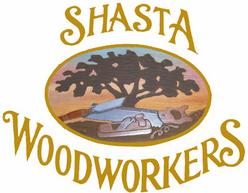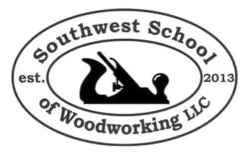This is the second in our classes for new and intermediate woodworkers. In this class you will have exposure to wood shop safety and the proper use of hand and stationary power tools.

This is the second in our classes for new and intermediate woodworkers. In this class you will have exposure to wood shop safety and the proper use of hand and stationary power tools. You'll learn how to properly operate a jointer, planer, table saw, miter saw, sander and router as you make the components for a cutting board.
Beyond just learning the ins and outs of power tools, Char will walk you through proper glue up and clamping techniques to avoid tedious clean up, wood alignment issues, and the different clamp styles generally used for woodworking projects. Finally, the class will end with how to finish and maintain your cutting board for years of use; or so it really pops when someone special unwraps it as a finely handcrafted present!
This class will provide you with the confidence and knowledge to know your way around shop tools, so you can get a jump start on your woodworking hobby, career, or side gig!. This class is less intense than our other Fundamentals of Woodworking class, but covers the same fundamental tool skills.
The Highland Woodworking store started out in 1978 as Highland Hardware, an ordinary hardware store in midtown Atlanta. It was founded by Chris and Sharon Bagby, a young couple who met at Georgia Tech, and after graduating and getting married, went to work together for an old Atlanta company known as King Hardware (which had the distinction in 1886 of selling to the druggist next door the washtub used to mix the first batch of Coca-Cola).
King Hardware
Led by George King for 50 years, King Hardware became a large chain numbering more than 20 Atlanta area hardware stores at its peak around 1950. It was about this time that a multi-purpose woodworking machine called the Shopsmith first came on the market, and King Hardware's main store at Five Points became a large dealership selling Shopsmiths.
Shopsmith
The young couple was assigned to manage the King Hardware store on Piedmont Road near Cheshire Bridge. There they met Monroe Simpson, an old-timer who had sold Shopsmiths for King back in the 1950s. Later Shopsmith went out of business, but around 1972 John Folkerth revived Shopsmith and the machine went back into production. At that time this particular King Hardware store was the only store in the southeast where someone could purchase a Shopsmith. Mr. Simpson sold a handful of Shopsmiths each year.
Realizing the uniqueness and potential of the Shopsmith, the Bagbys began actively demonstrating it to customers while using AJC want ads to attract people wanting to set up or expand a woodworking shop. Over time, sales grew to about 100 Shopsmiths a year, and gradually a woodworking community began growing around the King Hardware store.
Hardwood Lumber
Adding to the store's appeal to woodworkers, Leon Colwell, whose brother owned a sawmill in Blairsville, GA, began delivering weekly pickup truck loads of hardwood lumber for King Hardware to sell. The store bought a vintage 1905 Fay & Eagan 20-inch thickness planer and set up a planing mill in a small outbuilding behind the store, allowing the lumber to be sold dressed smooth on both sides. Leon's nephew Bob Kelley came on board and ran the hardwood lumber sales.
The store created a newsletter they called Wood News, which helped spread the word about this budding woodworking tool store. (In addition to woodworking tools and hardwood lumber, the store also continued selling all the usual hardware, plumbing, electrical, paint and garden tools and supplies.)
Highland Hardware
After four successful years at King, the young couple decided to go into business for themselves. They resigned from King Hardware, took out an SBA loan and rented a 2200 square foot storefront on North Highland Avenue that was within walking distance of their home, giving it the name Highland Hardware.
Good fortune in the form of a staff of bright, hardworking sales people helped lead to a prospering hardware business that soon identified itself as a specialist in woodworking tools, especially hand tools and supplies. Emphasizing quality and value, Highland Hardware began to build a reputation as a source of reliable advice on the purchase and use of the tools it sells.
Mail Order Catalog
In 1981 Chris began working on the creation of a mail order catalog to expand the reach of the business. That first effort resulted in a fairly crude 48-page catalog illustrated with black and white photos and mailed out to about 5000 customers. The second edition of the catalog in 1983 was a significant improvement, benefiting from knowledge gleaned while studying "The Last Whole Earth Catalog", whose subtitle was "Access To Tools" and included extensive instructions for creating your own Whole Earth Catalog.
Thereafter an updated edition of the Highland Hardware catalog was generated annually, and eventually three or four new editions appeared each year. Zach Etheridge contributed greatly to the catalog's content, and eventually he and Michele Grenet, a graphic artist whom Chris met while playing tennis, together produced the annual revisions. After Zach left Highland, Ed Scent worked with Michele for nearly two decades until his retirement in 2022, playing a major role in development of the catalog. Michele continues to create each new edition of the catalog, and has hand-drawn the cover of each catalog for the past 30 years.
Woodworking Classes
To help fan the flames of interest and excitement in the craft of woodworking, in 1980 the store began a weekend woodworking seminar program, bringing to Atlanta the likes of Tage Frid, Sam Maloof, Roy Underhill and Michael Dunbar to teach students attracted from the Atlanta area and around the country.
The first seminars were held in the basement of the original store. When Highland Hardware renovated a 5000 square foot store building across the street in 1984, the seminars moved into an old warehouse behind the new store. Thousands of woodworkers endured the hard, splintery bleachers and drafty conditions of that rustic facility to spend weekends with Mark Duginske, Toshio Odate, Rude Osolnik, Dale Nish, Ernie Conover, and numerous other gifted teachers. Zach Etheridge took care of scheduling and taught many basic skills classes himself.
Store Expansion
In 1995, 8000 square feet of space was added to the store, including a large comfortable room where woodworking classes are now taught. Norm Abram was the guest celebrity at the grand opening. Nationally known woodworking teachers like Peter Galbert, Christopher Schwarz, Mary May and Frank Klausz became part of the visiting faculty. You can check out some of the woodworking action on the Gallery Pages of our website.
Around the same time the store expanded, the decision was made to discontinue selling most of the merchandise normally sold by other hardware stores, and instead concentrate entirely on selling woodworking tools and supplies while further expanding its educational program.
Wood News, Highland's Newsletter
Before ever publishing a woodworking tool catalog, Highland Hardware had begun sending out to its customers its own product-oriented newsletter, first called “Wood Man” and later changed to "Wood News” after King Hardware closed. It offered news about woodworking tools and articles on woodworking tips and techniques. Published two or three times a year, it soon grew into a small woodworking magazine, actually one of the early examples of what came to be known as a "magalog" or "catazine". In 1992, the magazine format was merged into the store's comprehensive tool catalog. Its useful information about the tools we sell has been praised over the years by customers, journalists and tool manufacturers.
Highland Goes Online
In 1996, Highland Hardware took the plunge into e-commerce as one of the early woodworking tool companies to create an extensive website. Over the years, highlandwoodworking.com evolved into a major interface with woodworkers both near and far. The Internet also brought about the rebirth of "Wood News". In 2005 Highland Hardware began publishing Wood News Online as a monthly online newsletter. Highland customers who subscribed received Wood News Online monthly via email. Each issue features articles about new woodworking tools, useful techniques, customers' workshops, books, events and other news of interest to woodworkers.
Becoming Highland Woodworking
While we started out more than 40 years ago as a local hardware and woodworking retailer, we have grown to become exclusively a purveyor of fine woodworking tools. In 2006 we changed our name to Highland Woodworking as a truer reflection of the nature of our tool offering and our position in the woodworking marketplace. Nothing else changed; customers still receive the same quality tools and service and the same enthusiasm for woodworking they have come to rely on over the years. Our website and catalog currently account for 80% of our sales. Besides illustrating the store's comprehensive selection of woodworking tools, the website offers a huge resource of free woodworking tips and information.
Today our customers include modern artists and accomplished woodturners, as well as studio furniture designers, heirloom craftsmen and professional cabinetmakers. Perhaps numbering more than any other category, men and women with a small shop in their basement or garage have come to depend on the senior staff at Highland Woodworking for sound advice about our tools, as well as reliable service.
It is our pleasure to welcome you to our online woodworking store. Please let our staff introduce themselves on our Meet the Highland Woodworking Staff page. Chris and Sharon's adult daughters Kelley and Molly are among the many workers who have been with the store for longer than a decade. Several have worked here longer than 20 years.
If you enjoy your visit to Highland Woodworking's online store, we hope you'll pass the word along to your woodworking friends. We are always adding more signature hand tools and the latest power tool advances, so please bookmark us and check back often.

Wood working class is offered by Shasta Woodworkers Club

Woodworking course is offered by Phoenix Woodworking School. Whether as a hobby or a career, our one on one tutoring will be of value to them now and in the future.

Ready to move beyond the basics? The second step in our three-part Fundamentals series, this course builds on the skills taught in Fundamentals I and prepares you for even more advanced craftsmanship as you progress in your woodworking.

Master hand and power tools to elevate your woodworking skills! In this advanced class, you will get a review of tools and their proper usage as well as individualized guidance and demonstrations on advanced design.

This course will provide an introduction to woodcut printmaking. Fundamental relief techniques will introduce you to the tools and methods needed to allow you to carve and print from your own relief woodblocks.
© 2025 coursetakers.com All Rights Reserved. Terms and Conditions of use | Privacy Policy